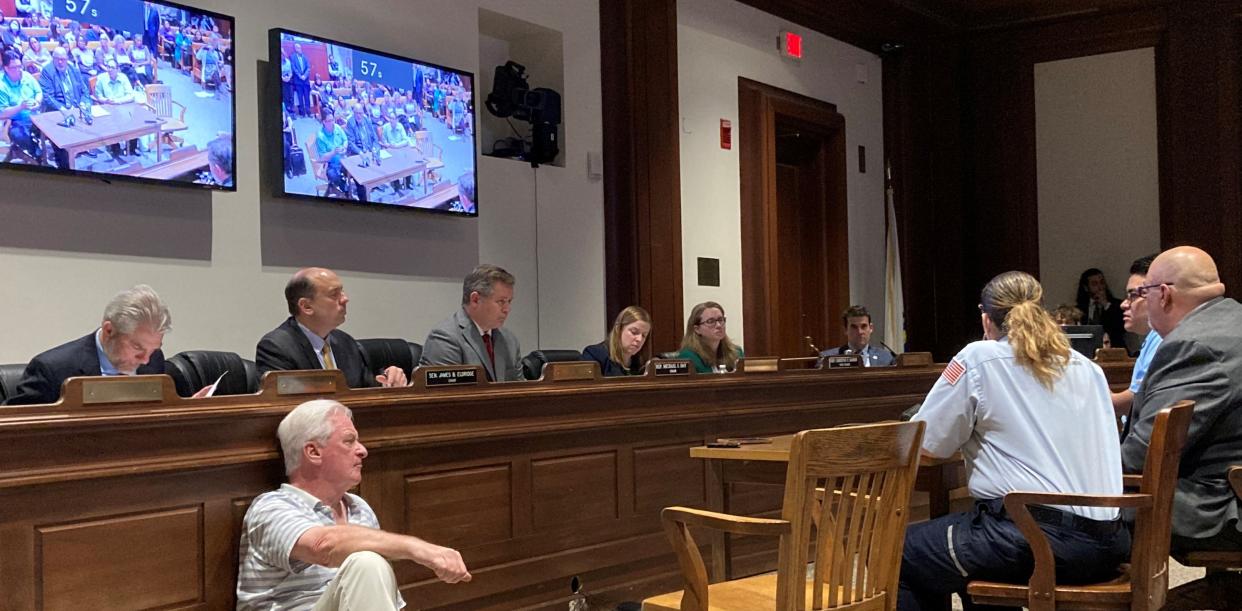State lawmakers hear testimony supporting several anti-workplace violence bills

BOSTON - One bus driver told legislators at a Tuesday hearing that a teenager she had asked not to vape on her bus had brandished a gun at her and smiled. Another operator was punched repeatedly in the face after asking a rider to place his bicycle on the front rack. Still another was attacked after asking a rider on the Green Line not to swear.
The MBTA workers were just three of more than a dozen people who testified in favor of bills that would criminalize assaults on employees in public positions - MBTA employees, corrections officers, nurses and even those with second jobs officiating youth sports across the state.
Gut-wrenching stories make point
“I love my job,” said Carlos Campos, a motorman on the E branch of the Green Line. “It’s the best job I ever had. But it’s tough.”
Campos was working the Heath Street route one night in March when a drunken passenger berated him and his partner and then started getting physical with them.
Cheryle Bradley, who has been a bus operator for more than 16 years and drives out of the Cabot Garage, had suffered six verbal assaults in 13 days; one where a passenger threatened to “murder” her. Another incident caused her blood pressure to soar and she spent seven hours in the emergency room waiting for it to normalize. After taking some time off, she returned to a situation where a teenager brandished a gun in her face.
“I have never been so scared in my life,” Bradley said.
Legislators heard a stream of workers step forward with their stories of being verbally abused and physically assaulted.
John Corby, a chief inspector on the Green Line, was physically attacked, punched repeatedly in the face Jan. 30 and has yet to return to work. Corby, who suffered a concussion, a broken thumb and was bitten on the hand by his assailant, had simply asked the rider not to curse on his train.
“I’m suffering from PTSD, depression, anxiety, insomnia,” Corby said.
Mass. urged to join other states in protecting workers
Billy Bernardino, vice-president of the Boston Carmen’s Union, Local 589, pleaded with legislators to extend workplace protection to his members and to allow his union to encompass private railroad employees working on public conveyances.
“Assaults on transit workers have increased for years,” Bernardino said. “It’s time for Massachusetts to protect its workers. In February there were 24 assaults, workers were stabbed, punched, had urine and feces thrown at them, hot coffee and were threatened with guns.”
He reminded the legislators sitting on the Joint Committee on Judiciary that it was the transit workers who showed up daily during the COVID-19 pandemic, transporting essential workers to their jobs.
“They are heroes and deserve a safe workplace,” Bernardino said.
Another bill on the table would extend consequences for attacks on corrections officers.
“There are countless incidents,” said Guy Glodis, a former Worcester County Sheriff and a legislative agent for Massachusetts Correction Officers Federated Union.
“We believe reducing violence in corrections facilities will increase officer safety,” Glodis said, explaining the bill sponsored by Rep. Jonathan Zlotnik, D-Gardner, would address the types of assaults that result in serious bodily harm - disfigurement, loss of limbs or use of internal organs, and the threat of death.
“We see this type of violence regularly,” Glodis said.
Protection for nurses, sports officials
Massachusetts nurses also testified to the increasing level of workplace violence; noting that there is a reported assault every 38 minutes somewhere in the state.
Extending protections to health care workers makes sense, said Katie Murphy, president of the Massachusetts Nurses Association and an ICU nurse at Brigham and Women's Hospital in Boston. New Jersey just extended similar protections to its nurses May 8.
“Verbal, physical assaults are the norm now,” Murphy told the legislators, warning that the worker shortage many complain about will only intensify if controls are not enacted. “There are thousands of open nursing positions in Massachusetts hospitals; many workers say they will leave due to the violence. There is a need for consequences and accountability."
Holly Zeikos, a nurse at Good Samaritan Medical Center in Brockton, remembers an assault that took place Christmas night in 2005. The level of violence has intensified since then, escalating by 67%. “Massachusetts must protect its health care workers,” Zeikos said.
The state’s sporting officials also spoke about the need for protection. Rep. Steven Xiarhos, R-Barnstable, called for enhanced protections for sporting officials and penalties against those who would attack people who serve the public.
“They deserve protection,” Xiarhos said. His bill would extend protections to residents serving as officials at sporting events.
“They are our neighbors, friends, teenagers as young as 17 (who) serve as officials. They don’t deserve physical and verbal harassment,” Xiarhos said.
Mark Rulli, of Hingham, who officiates girls high school basketball games, told lawmakers that umpires and referees sign up to call balls and strikes, not to be yelled at.
“There’s something wrong in youth sports now,” Rulli said. He noted that 22 states offer protections to sports officials and said it was time Massachusetts joined them. “If we don’t change the culture, there will be no officials to call games.”
This article originally appeared on Telegram & Gazette: Workplace violence escalating against employees in public fields

